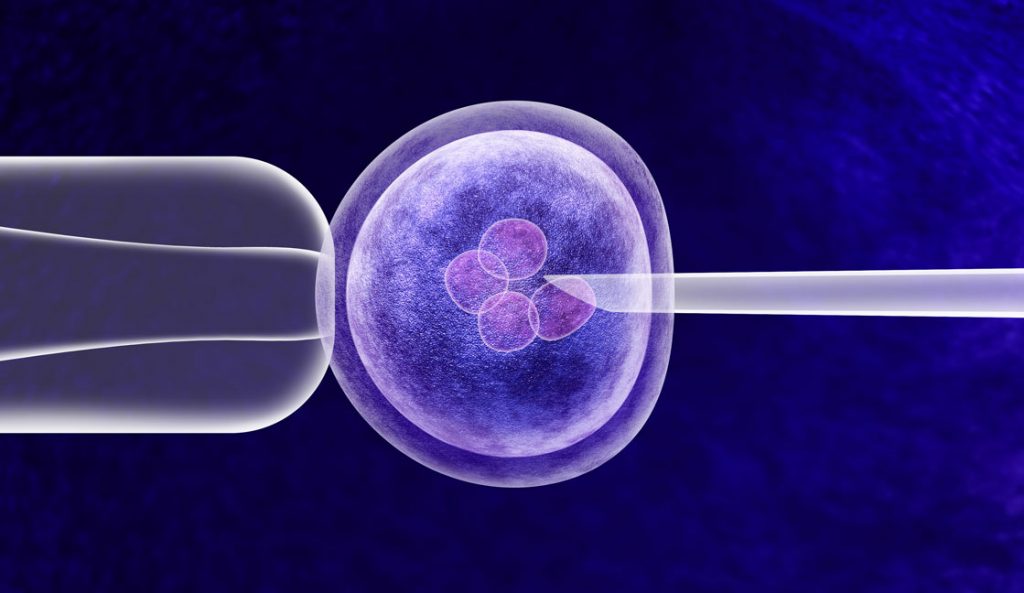If you are thinking about undergoing fertility treatment, it’s likely you’ll have heard of the two most common types of treatment: IVF and ICSI. But what’s the difference between IVF and ICSI?
IVF stands for ‘in-vitro fertilisation’ and ICSI stands for ‘intracytoplasmic sperm injection’. Both of these treatments are examples of assisted conception.
IVF involves collecting eggs from a female patient using a needle which passes through the vagina and into each ovary under the guidance of ultrasound. The procedure is carried out under sedation and you will not feel any pain. The eggs are then mixed with sperm in a laboratory dish, and checked after 16-20 hours to see if the sperm have naturally fertilised any eggs. If the treatment has worked, the fertilised eggs will develop in the laboratory for a further two to five days before being transferred into the womb. A pregnancy test can be taken two weeks after the egg collection to check if the IVF treatment has succeeded and implantation has taken place.
Dr Amin Gorgy, Fertility Consultant at The Fertility & Gynaecology Academy explains: “ICSI is very similar to IVF; the difference lies in the fertilisation stage. When the eggs arrive in the laboratory, fertilisation is attempted by injecting a single active normal-looking sperm, picked up under the microscope, into each egg using a very fine needle. The fertilised egg is then transferred to the womb and the success can be determined with a pregnancy test after two weeks.”
The History of IVF and ICSI
The first birth to occur following successful IVF treatment was Louise Brown in the UK in 1978. The treatment was developed by British nurse Jean Purdy, physiologist Robert Edwards and obstetrician and gynaecologist Patrick Steptoe. Louise’s parents had struggled to conceive a child for nine years prior to her birth, citing blocked fallopian tubes as the cause of infertility.
Following Louise’s birth, the same team was responsible for the first boy to be born through IVF in 1979. The method began to be used in Australia and the US, and was further refined to allow the conversion of IVF from a research tool to a treatment offered in fertility clinics.
The first successful birth using ICSI was recorded in 1992 and the treatment was carried out by Gianpiero Palermo after researching and developing the treatment at the Vrije Universiteit Brussel. Today, ICSI is utilised in nearly 66% of all assisted reproductive treatments worldwide and is sometimes recommended in the case of failure of fertilisation in conventional IVF.
IVF or ICSI: Which treatment should I have?
IVF is suitable as a treatment for a wide range of fertility issues, such as problems with ovulation due to polycystic ovary syndrome, genetic disorder, or blocked, damaged or absent fallopian tubes.
ICSI is more relevant in the event of male infertility. This is because the sperm will not have to work as hard as it would in natural fertilisation, due to the fact that it is injected directly into the egg. Male fertility issues can include a low sperm count, poor sperm mobility or high percentage of abnormal sperm. ICSI may also be recommended if the sperm has been frozen, or if it has been surgically removed from the epididymis or the testis (for example, in the case of a vasectomy).
Other forms of assisted conception
Intrauterine insemination (IUI), also known as artificial insemination, involves inserting sperm into the womb through a fine plastic tube, which is passed through the cervix in a relatively non-invasive procedure.
IUI is commonly used by single women using sperm collected from a donor; however, it may also be used if vaginal sex is not possible, if you have a condition which prevents you from conceiving naturally, or if you are in a same-sex relationship.
The cost of assisted conception
IVF and ICSI can vary in price, depending on the clinic, the complexity of the case and the individual needs of the patient. To find out about our rates please see our Fees page. You can book a consultation at our clinic by calling us on 020 7224 1880.
If you have any other questions, please do not hesitate to call our administration team on 020 7224 1880 or email us on info@fertility-academy.co.uk.







